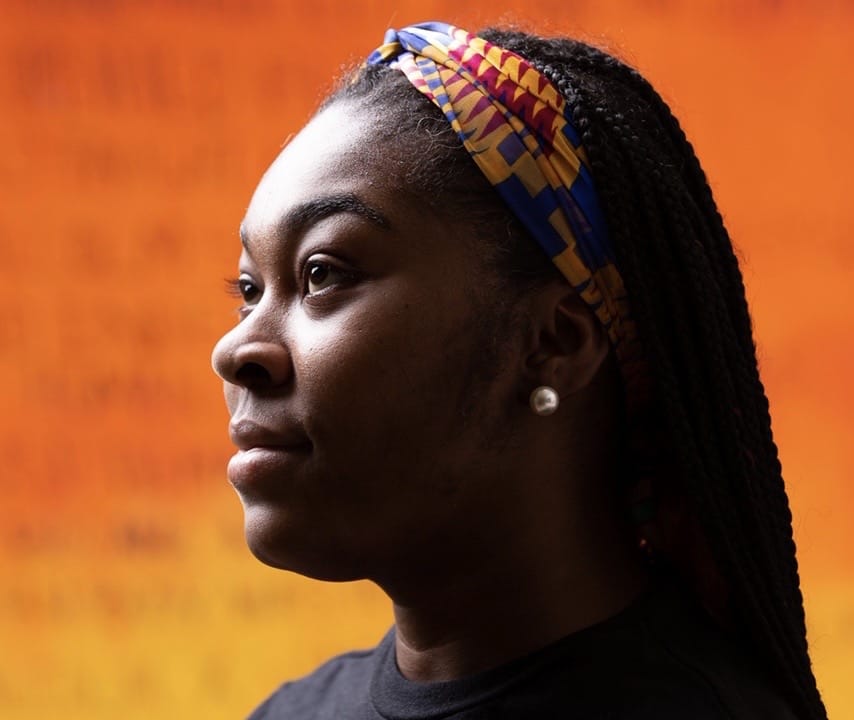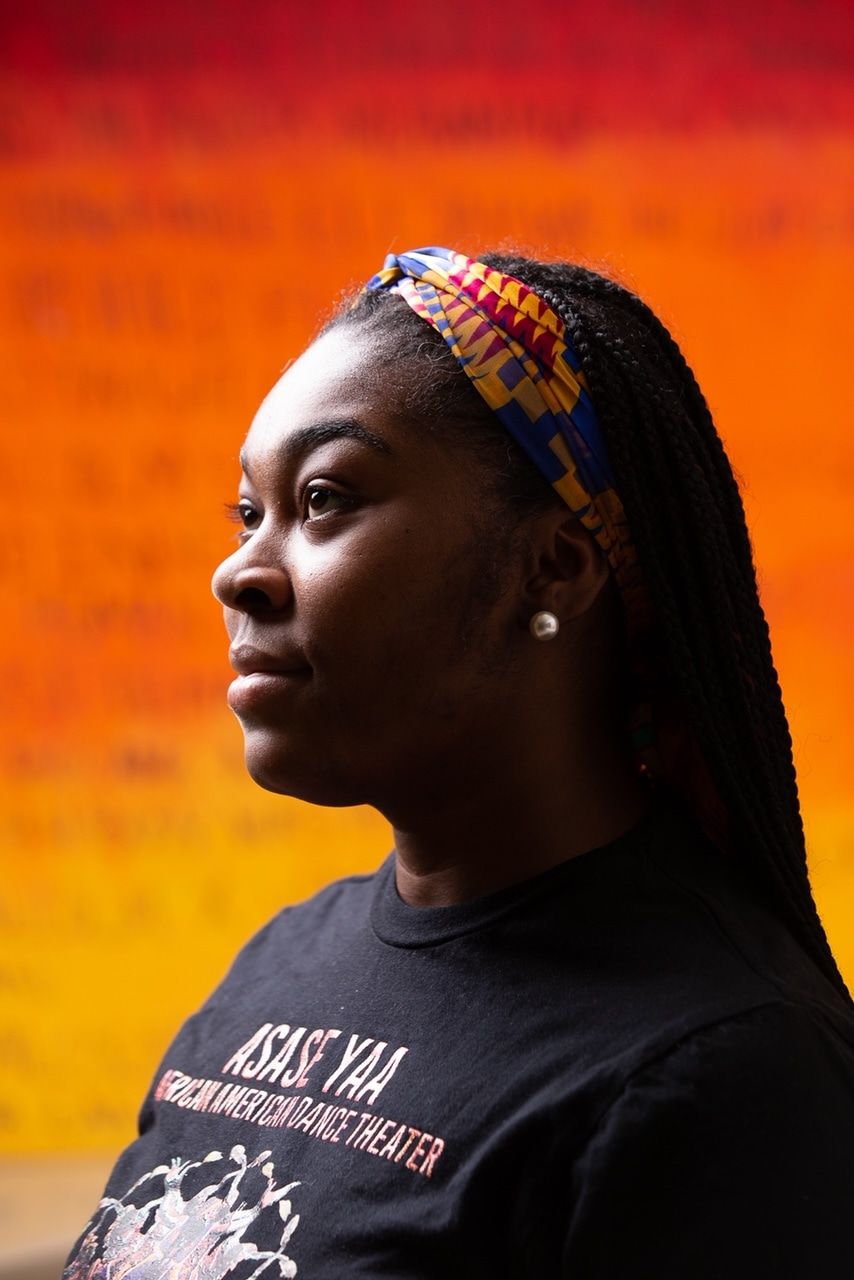Rubie Inez Williams On Investing In The Black Youth Through The Arts


BED STUY – Rubie Inez Williams believes in a strong community. She believes that the youth will excel if there a community to love and support them. She believes in investing in the Black youth, something she’s been doing for years.
Williams was born in California. When she was about three years old, her family moved to Brooklyn. She was raised in Flatbush and now calls Bedford Stuyvesant her home. Williams is currently a middle school science teacher, as well as the Director of Operations at Asase Yaa, a cultural arts foundation based in Brooklyn.
Asase Yaa means Mother Earth, and it’s an organization that teaches the youth African and African diasporic dance, martial arts, musical instrument performance, musical theater, and acting. One thing Asase Yaa is known for is its summer camps. Every year, the youth would gather for six weeks and learn dancing, drumming, arts/crafts, and acting. At the end of the six weeks, they put on an original play that incorporates African history and everything they’ve learned.
Their summer camp is expected to continue this year, with a lot of precautions including social distancing rules. It won’t be the same, but it is some normalcy in these crazy times. A lot of the youth in Bed Stuy (and in the city as a whole) rely on the Summer Youth Employment Program (SYEP) for summer jobs. Since SYEP was canceled this year amidst the pandemic, the young adults that would have relied on it to make money, now have nowhere to go. Asase Yaa is hoping to make a difference.
“I know young people who are either preparing for, or are in, college and were planning on using the money toward their books,” Williams told Bklyner. “I know young people who were planning on using that money for school supplies. I know some parents were not able to work or were receiving less income because of the pandemic, so summer youth was also a way to support their families.”
For the first time ever, Asase Yaa is crowdfunding to raise $50,000 for their new initiative– the Asase Yaa Youth Summer Employment Initiative. This will provide 20 young people with employment this summer, “in an effort to do our best help to fulfill that gap that we know has been created by the cancellation of SYEP. And it’s for the youth to know that they have our support,” Williams said.
For Williams, investing in youth is vital. She explained that when we invest in the youth, “we are investing in the longevity of the future of our community.” She said it’s important young people know the importance of their community.
“It is the strength of any people,” she said about having a community. “Having that extended family and support is really important because it allows you to have a sense of pride and a sound of groundedness. It allows us to be able to support each other. It allows us to be connected to one another and to propel forward.”
Williams, through her teaching job, and through Asase Yaa, strives to be there for the Black youth. She believes that the arts play a valuable role in society– a role that is often overlooked by many.
“It plays a valuable role in our ability to connect with ourselves, connect with our own cultures, connect with other human beings,” she said. Williams has been dancing since she was four years old. Through dancing and through her performances, she created her community. “There’s a level of connection you have when you are able to perform with each other on the stage. There’s a level of comradery that is created.”
A few weeks ago, George Floyd was murdered. She remembers being angry and disheartened. Sad but not surprised. She wasn’t sad for herself, though. Her mother was a Black Panther in Oakland, California. So she knew and understood the level of systemic racism that exists in this country. She was sad for the youth.
“I think that I was saddened only because I know that for young people it may have been a new experience. Particularly for the Black youth,” she said. “My son is Black. To be the mother of a Black son and a Black daughter, it’s angering and it’s scary.”
Her son is 15-years-old. She explained that there have been several cases where young boys have been seen as adults and seen as a threat. She is afraid all the time, which is why she’s constantly thinking about how she’s going to teach her birth children, her children from school, and the children in the community how to navigate this space forward.
“We all have a role to play,” she said. “It’s about making sure these kids understand what’s happening and giving them an outlet and tool to be able to move forward and provide them with support, and focusing on what it is we can do moving forward and giving everybody space and room to feel how they feel whether it be anger or sadness, and being able to focus that energy to move forward.”
Williams’ goal is to have the Black youth be committed to themselves and their development. She wants them to be committed to their communities and to one day build their own communities. She wants them to understand their value.
“With everything that’s going on with the Black Lives Matter movement and racial tensions, the main tool for change is really rooted in our commitment together, planning forward for the future of families and communities and really getting them to understand the importance of that,” she said. “To give our youth a family and a community that they are able to grow up in and be a part of and learn from; that is important to me.”
Williams wants kids to love the color of their skin.
“We wake up every day and we’re Black. It’s not something that can change and it’s not something that I want to change,” she said. “But it provides me with every part of who I am; my sense of community, my understanding of culture, my spirituality.”
She has always recognized the way Black people were brought to this country– through the Transatlantic Slave Trade, she explained. But you have to recognize that and then recognize how they continued to push forward and strive despite it.
“We have over time, been inventors here in America, business owners, community leaders, created our own communities. We always pushed forward and provided ourselves in the wider world with a viewpoint of what it looks like to be determined and to have ingenuity and to have passion for our growth,” she said. “Me being able to go to a historically Black college, me being able to own a home, me being able to have a business, and me being able to give back to my community… there’s a very high level of pride and dignity that I hold with that in the same breath.”
To donate to Asase Yaa’s Youth Summer Employment Initiative, check out their page here.
The photo in the story was taken by Dominique Sindayiganza, a talented local photographer and you can view more photos on their Instagram under @sindayiganza. And check out the website here.




